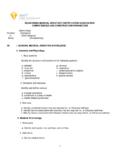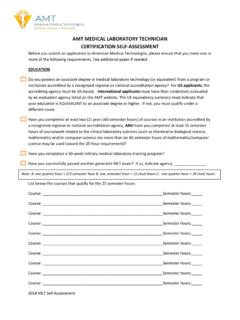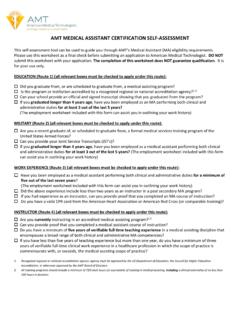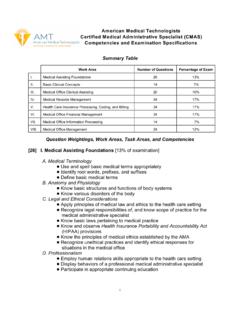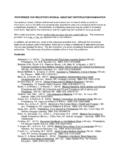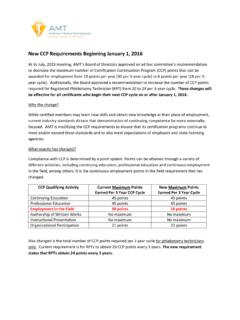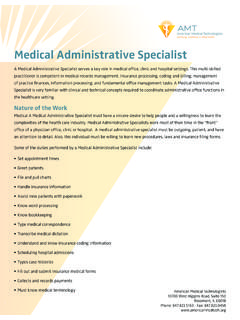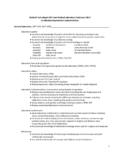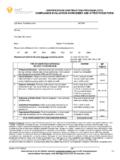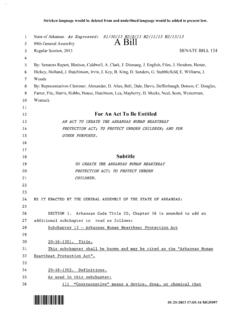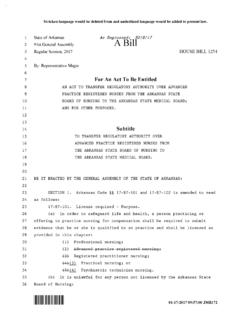Transcription of The Lawful Scope of Practice of Medical Assistants …
1 110|AMT EventsJune 2012 The Lawful Scope of Practice ofMedical Assistants 2012 UpdateMichael N. McCarty,Esq.[Editor s note: The following is asubstantially updated and expand-ed version of an article originallypublished in March 1996 and previ-ously updated in the March 2003issue of AMT Events.] The AMT office frequently receivesinquiries from Registered MedicalAssistants about the Lawful extent oftheir clinical Practice Scope . Typicalof such inquiries are the following: The state nurses associationsays that Medical assistantsaren t allowed to give this correct? Is a Medical assistant permittedto start an IV? Am I allowed to perform scratchtests for allergies?
2 Can Medical Assistants do pul-monary function testing? What types of laboratory testingare Medical Assistants qualifiedto perform?For better or worse, there is nouniversal answer to these is no uniform, national defini-tion of a Medical assistant s Scope ofpractice. These types of inquiriesusually must be answered by refer-ence to the particular laws and cus-toms of the state in which the med-ical assistant works. With respect todiagnostic lab testing, in addition toany applicable state laws, an MA squalifications to perform a particu-lar test depends on whether he orshe meets the applicable criteria fortesting personnel under the a vast majority of states , med-ical Assistants may perform basicclinical procedures under the directsupervision of a licensed medicalpractitioner ( , physician, osteo-path, podiatrist, and in some casesphysician Assistants or nurse practi-tioners).
3 However, the legal frame-work governing the delegation ofclinical tasks to unlicensed assistivepersonnel varies greatly from state tostate. While most states still don thave laws or regulations specificallyaddressing the Practice of medicalassisting, the number of states withsuch laws has continued to grow inrecent years. Many states that do notaddress Medical assisting by namenevertheless have statutes or rulesacknowledging a licensed practition-er s authority to delegate clinicaltasks to an unlicensed assistant , aslong as certain conditions are met. State laws affecting the Scope ofmedical assisting Practice generallyfall into one of three categories:1.
4 Laws that expressly recognizethe Practice of Medical assisting andlist some of the specific clinical func-tions that properly qualified medicalassistants may perform; 2. Provisions in state Practice actsthat preserve the right of licensedpractitioners to delegate basic clini-cal tasks to unlicensed Assistants orexempt such Assistants performanceof delegated tasks from legal defini-tions of unauthorized Practice ; or3. Laws governing licensed practi-tioners of the healing arts that aretotally silent as regards the delega-tion of clinical tasks to unlicensed personnel. Recent Laws Expressly RecognizingMedical AssistingWhen we last published a survey of state laws in 2003,there were just seven states (Arizona, California, Florida,Maryland, New Jersey, South Dakota, and Washington)that had statutes or regulations directly addressing thepractice of Medical assisting.
5 Since then, four more stateshave passed laws recognizing a clinical Practice Scope formedical Assistants : arkansas , Montana, Georgia andNevada. In addition, earlier this year the State ofWashington enacted comprehensive Medical assisting leg-islation that will replace that State s previous, unwieldyscheme for regulating health care Assistants . A brief sur-vey of MA-specific laws follows, starting with the mostrecent On March 29, 2012 , Governor ChristineGregoire signed into law Senate Bill 6237, described as anAct creating a career pathway for Medical Assistants . Thenew law replaces the prior scheme of registering sevendifferent categories of health care Assistants (HCAs)with a new system for certification or registration offour separate levels of Medical Assistants .
6 The newcategories are: (1) Medical assistant -certified; (2) Medical assistant -phlebotomist; (3) medicalassistant-hemodialysis technician; and (4) med-ical assistant -registered. The WashingtonDepartment of Health will administer the pro-gram for certifying or registering Medical assis-tants in appropriate categories. Individuals currently reg-istered with the Department as HCAs will be grandfa-thered into a corresponding category of MA, and the HCAregistrations will be discontinued. To qualify as a Medical assistant -certified, an individ-ual must complete a Medical assisting training programapproved by the Health Department, pass a certificationexam approved by the Department, and meet any addi-tional requirements imposed by regulations to be devel-oped by the Department.
7 The Scope of Practice of the med-ical assistant -certified may encompass a broad range ofclinical procedures, including capillary blood withdrawal,venipuncture, intradermal, subcutaneous and intramuscu-lar injections, EKGs, respiratory testing, lab tests classifiedas waived under CLIA, and administering medicationonly by unit or single dosage, or by a dosage calculatedand verified by a health care practitioner. A Medical assis-tant-certified may also administer intravenous injectionsfor diagnostic or therapeutic agents, if he or she meetsminimum standards to be established by licensed practitioner must certify to the Departmentthe Scope of clinical procedures that an individual med-ical assistant -certified is competent to perform, whichmay be less inclusive, but not more inclusive, than the listof procedures set forth in the law.
8 The certification isportable from one employer to another. The Medical assistant -registered category is forassistive personnel who do not meet all the qualificationrequirements for the certified category but whose currentemployer attests the individual is competent to performbasic clinical procedures. The Scope of Practice for med-ical assistant -registered is more limited than for medicalassistant-certified. It cannot include, for example,venipunctures, capillary blood draws, or injections otherthan vaccines. An individual s Scope of Practice is furtherlimited by the endorsement received from his or her cur-rent employer. Unlike with the Medical assistant -certified,the employer endorsement for a Medical assistant -regis-tered is not portable and must be renewed by each the new statute is an improvement over the priorsystem of registering HCAs, the unfortunate use of theterms certified and registered to distinguish morehighly-trained MAs from those with lesser education andskills is bound to create confusion.
9 It should beemphasized that the legislative distinction between Medical assistant -certified and Medical assis-tant-registered has nothing to do with private,voluntary credentials ( , whether someone iscredentialed as a Certified Medical assistant bythe AAMA or as a Registered MedicalAssistant by AMT). But the public is boundto be misled by the statutory titles, and it isextremely important for RMAs inWashington State to educate employers that, regardless ofthe title of your credential, you are indeed certified, andnot just registered. Indeed, most RMAs who have com-pleted a Medical assistant education program at anaccredited institution should qualify as Medical assistant -certified.
10 Those who have previously been registered withthe State as a Category C, D, E, or F health care assistantwill be grandfathered as Medical Medical assistant -phlebotomist is essentially aphlebotomy technician, who may perform capillary,venous, or arterial invasive procedures for blood with-drawal when delegated and supervised by a licensedhealth care practitioner. The qualifications for this cate-gory will be determined by rulemaking. Individuals hold-ing AMT s Registered Phlebotomy Technician (RPT) cre-dential should qualify, and those currently registered as aCategory A or B health care assistant will be grandfa-thered as MA-phlebotomists.
